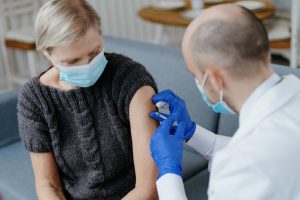The Importance of Flu Shots

As the year winds down, the annual flu season is revving up. Marc Lumsden, DO, family medicine physician at Cape Physician Associates, explains the necessity and benefits of getting the flu shot once the winter months approach.
“During colder months, the flu virus tends to be more prominent. Families and individuals are spending more time indoors and are in closer contact with one other, allowing for quicker and easier transmission of the flu virus,” says Lumsden.
The flu is a viral illness that causes various symptoms: including fever, chills, cough, sore throat, muscle and/or body aches, headaches, fatigue, and runny/stuffy nose. “There is an annual vaccine that is widely available for combatting and protecting oneself from the flu and aiding with the spread of the virus. Findings from many studies show the effectiveness of the flu vaccine. Patterns pulled from these studies indicate that repeated benefits include a direct decrease in flu infection, a reduction in the severity of illness when infected, or a decrease in the possibility of death related to the flu,” notes Lumsden.
“I would encourage anyone over the age of six months to get a flu shot, with exceptions being those who have prior medical conditions or immunosuppression which a flu vaccine could exacerbate,” recommends Lumsden.
“There is beneficial gain toward personal and public health by receiving a flu vaccine, meaning it is both beneficial to the person getting the vaccine and those around the person who received a vaccine and decreased the risk of transmission all around,” says Lumsden.
With the year winding down and people coming together, do not let the flu be the reason to stay apart. Multiple preventative measures are available to reduce the transmission of the flu virus, and getting a flu vaccine each year is an easy start.
Talk to your primary care provider about getting a flu shot. Visit sfmc.net/primarycare.
This project is supported by the Health Resources and Services Administration (HRSA) of the U.S. Department of Health and Human Services (HHS) as part of an award totaling $594,348 with zero percent financed with non-governmental sources. The contents are those of the author(s) and do not necessarily represent the official views of, nor an endorsement, by HRSA, HHS, or the U.S. Government. For more information, please visit HRSA.gov.

